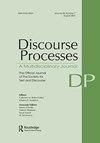Exploring the spatial gradient effect in narratives
IF 2.1
2区 心理学
Q2 PSYCHOLOGY, EDUCATIONAL
引用次数: 0
Abstract
ABSTRACT The current set of experiments was designed to explore the processing of spatial information during reading, specifically the spatial-shift effect and the spatial-gradient effect. Experiments 1 and 2 demonstrated that when participants were presented with text alone (i.e., without prior map memorization, virtual environments, task demands, or prior knowledge of the spatial information), the spatial-shift effect does emerge. Using the time to name a spatial location as a measure of spatial activation, participant naming times were faster for the original spatial location when the protagonist had moved a smaller distance relative to when the protagonist had moved a larger distance. Further, Experiment 3 provided evidence to support that a spatial gradient of activation is evident; this was done by adding an additional point of spatial distance in which the protagonist did not move from the initial location. The results are discussed within the context of the memory-based view of text comprehension.探索叙事中的空间梯度效应
本实验旨在探讨阅读过程中空间信息的加工,特别是空间位移效应和空间梯度效应。实验1和2表明,当参与者单独面对文本时(即,没有事先的地图记忆、虚拟环境、任务要求或对空间信息的先验知识),空间转移效应确实出现了。使用命名空间位置的时间作为空间激活的衡量标准,当主角移动的距离较小时,参与者命名原始空间位置的时间要比主角移动的距离较大时快。此外,实验3提供了证据支持空间梯度的激活是明显的;这是通过添加一个额外的空间距离点来实现的,在这个空间距离点中主角不会从初始位置移动。研究结果将在基于记忆的文本理解观点的背景下进行讨论。
本文章由计算机程序翻译,如有差异,请以英文原文为准。
求助全文
约1分钟内获得全文
求助全文
来源期刊

Discourse Processes
Multiple-
CiteScore
4.30
自引率
4.50%
发文量
27
期刊介绍:
Discourse Processes is a multidisciplinary journal providing a forum for cross-fertilization of ideas from diverse disciplines sharing a common interest in discourse--prose comprehension and recall, dialogue analysis, text grammar construction, computer simulation of natural language, cross-cultural comparisons of communicative competence, or related topics. The problems posed by multisentence contexts and the methods required to investigate them, although not always unique to discourse, are sufficiently distinct so as to require an organized mode of scientific interaction made possible through the journal.
 求助内容:
求助内容: 应助结果提醒方式:
应助结果提醒方式:


